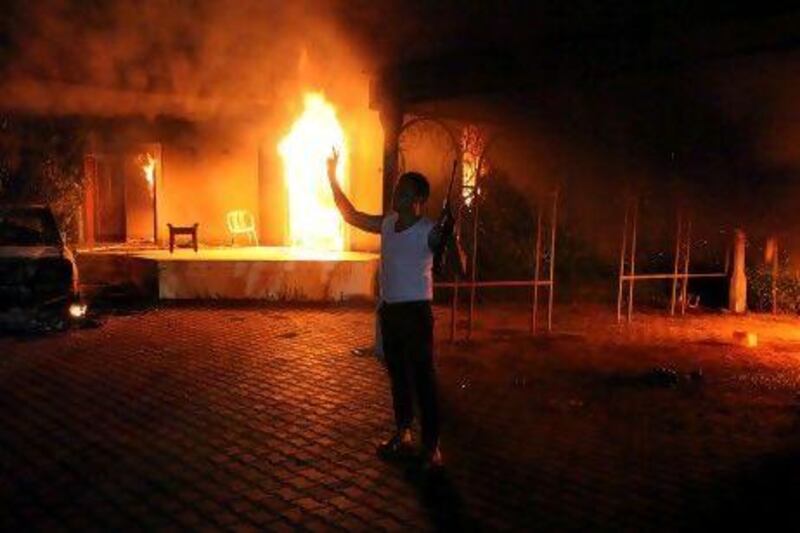CAIRO // The initial reports were short on detail, but they were ominous. The US consulate in Benghazi had been stormed, and a member of consular staff had been killed.
Earlier, at the US Embassy here in Cairo, what had at first appeared to be something equally shocking had turned out to be less so: about 1,500 protesters, having taken down the US flag and replaced it with the black banner of militant Islam, were content to chant anti-American slogans and scrawl graffiti on the walls.
It all felt kind of silly. A group of fringe American fundamentalists had succeeded in provoking a group of fringe Egyptian fundamentalists, many of whom appeared not even to have seen the obnoxious and amateurish movie they were all so incensed about.
Nobody learnt anything and the end result was a minor PR debacle for the young administration of the president, Mohammed Morsi.
Then news broke that the dead man in Benghazi was in fact the US ambassador to Libya, J Christopher Stevens. At that moment, all hope was lost that this mini-firestorm might quickly blow over.
Make no mistake, this is an earthquake - the effects of which will extend deep into the American presidential race and could affect the fate of the Syrian revolution.
The plausible worst-case scenario is that this becomes, for many Americans, a referendum and negative judgment on the Arab Spring.
It had started off almost like the punchline to a bad joke. On Tuesday evening, a roomful of journalists, including several foreign correspondents, gathered in a posh Cairo hotel's ballroom for a press conference to wrap up a heavily hyped US trade delegation to Egypt.
The mood was optimistic and self-congratulatory. A group of American corporate executives sat alongside their Egyptian counterparts, all of them hailing that the newly democratic Egypt was stable and open for business.
"I can't tell you how important stability and transparency are to US companies," said G Steven Farris, chief executive of Apache, an American petroleum company. "This country truly is on the cusp of having a tremendous influx of people ready to do business."
Right around the time that Mr Farris was saying those words, news started coming in on journalists' smartphones that something shocking was happening at the US Embassy across town.
A seemingly harmless protest by hardcore Salafi Muslims outside the fortress-like embassy walls had apparently spun out of control.
There were images of young protesters scrambling over the walls.
Eventually, the truth emerged as something quite a bit less dramatic than the "storming" of the Cairo embassy. Having made their symbolic flag gesture, the protesters made no moves to threaten the embassy buildings or staff.
Events in Benghazi went far beyond that. The circumstances of Stevens's death are still subject to confusion and conflicting narratives, but regardless of the details, the symbolism is beyond terrible.
After all, it was the US and Nato that saved Benghazi less than 18 months ago, beating back Muammar Qadaffi's encroaching army literally hours before the rebel stronghold would have fallen.
This may, from the perspective of even moderate Americans, be unforgivable.
We can expect this instantly to become an issue in Barack Obama's campaign for re-election as US president. Mr Obama has already been fending off charges from the right that he "lost" Egypt to the fundamentalists and stood by while militant Islamists hijacked the Arab Spring.
This will only add fuel to those charges, and could prove convincing to on-the-fence American voters who have nervously watched the Muslim Brotherhood ride the ballot box to power in Egypt.
It could also dampen any American enthusiasm for intervention to depose the beleaguered regime of the Syrian president, Bashar Al Assad.
The US secretary of state, Hillary Clinton, has recently begun making veiled threats of unilateral "coalition of the willing" intervention in Syria to skirt the UN Security Council roadblocks presented by China and Russia.
But given how things seem to be going in Libya, what is the point of helping to liberate a people who might turn on you within a year?
Perhaps the most depressing conclusion to be drawn from this whole burgeoning disaster is that whoever the bigots are who helped to fund this movie, with the aim of insulting and provoking the Muslim world, must now absolutely feel as if they got their money's worth.
[ foreign.desk@thenational.ae ]
Ashraf Khalil is a Cairo-based journalist and the author of Liberation Square: Inside the Egyptian Revolution and the Rebirth of a Nation.






